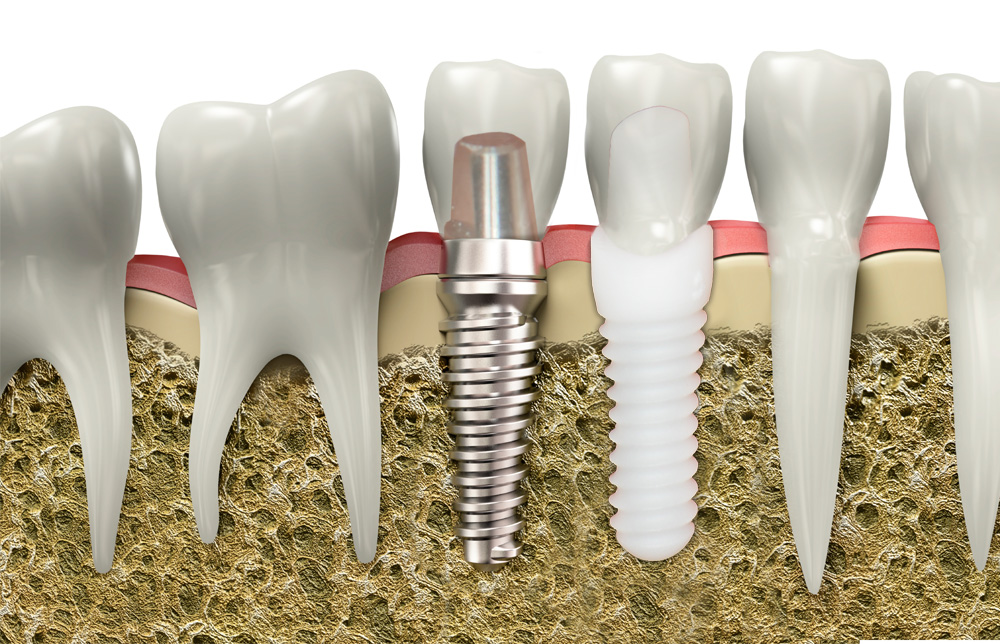Seramik İmplant
İletişime Geç
Seramik İmplant
Seramik implantlar, doğal görünümlü ve biyouyumlu bir çözüm arayan hastalar için metal içermeyen alternatiftir. Yüksek mukavemetli zirkonyumdan üretilen bu implantlar, özellikle ön dişler için olağanüstü estetik sunar ve metal alerjisi riskini ortadan kaldırır. Hassas sistemlere sahip veya bütünsel diş bakımını tercih eden hastalar için idealdir.

Seramik İmplantlar Nedir?
Seramik implantlar, geleneksel titanyum diş implantlarına yenilikçi bir alternatiftir. Yüksek dayanıklılığa sahip zirkonya (zirkonyum dioksit) malzemesinden yapılmış olan bu implantlar %100 metal içermez ve biyouyumlu oldukları için, diş kaybında daha doğal ve bütünsel bir yaklaşım arayan hastalar için ideal bir seçenektir.
Metal alaşımlardan yapılan titanyum implantların aksine, seramik implantlar beyaz renktedir ve dişlerin ve diş etlerinin doğal tonuna çok yakın bir görünüm sunar. Bu estetik avantaj ve biyolojik uyumlulukları, seramik implantların hastalar ve bütünsel diş hekimleri arasında giderek popüler olmasını sağlamaktadır.
Seramik İmplantların Temel Faydaları
1. Metalsiz ve Hipoalerjenik
Seramik implantların en önemli avantajlarından biri tamamen metal içermemesidir. Bu, metal alerjisi olan, hassasiyeti bulunan veya vücutta metalin sistemik etkilerinden endişe duyan hastalar için özellikle önemlidir.
2. Üstün Estetik
Zirkonyanın beyaz rengi, doğal diş kökünü yakından taklit eder ve özellikle ince veya çekilen diş etine sahip hastalarda titanyum implantlarda görülebilen gri çizgi riskini azaltır.
3. Biyouyumluluk
Zirkonya, vücudun dokularıyla uyumlu olup, implant çevresinde sağlıklı kemik büyümesini destekler ve iltihaplanma veya reddetme riskini azaltır.
4. Düşük Plak Tutunma Eğilimi
Seramik implantlar, bakterilerin ve plağın yapışmasını zorlaştıran pürüzsüz, gözeneksiz bir yüzeye sahiptir. Bu durum, implant başarısızlığının yaygın nedenlerinden biri olan peri-implantit riskini azaltır.
5. Isı ve Elektrik Yalıtımı
Metal implantların aksine, seramik implantlar ısı ve elektriği iletmez. Bu da ağız ortamında daha iyi konfor ve stabilite sağlar.
Seramik İmplantlar Ne Zaman Tavsiye Edilir?
Seramik implantlar, geleneksel implantlara aday olan çoğu hasta için uygundur. Özellikle aşağıdaki durumlarda önerilir:
- Metal alerjisi veya hassasiyeti olan hastalar
- Bütünsel veya biyolojik diş hekimliği prensiplerini benimseyen hastalar
- Estetik kaygıları olan bireyler (özellikle ağız ön bölgesinde)
- Otoimmün veya kronik inflamatuar rahatsızlıkları bulunan hastalar
Ancak, kemik yoğunluğu, diş eti sağlığı ve genel ağız koşullarına göre uygunluk, diş hekimi tarafından kapsamlı bir değerlendirme ile belirlenmelidir.
Seramik İmplantların Yerleştirilme Süreci
- İlk Muayene: Kemik hacmi ve yapısını değerlendirmek için dijital röntgenler ve 3D görüntüleme yapılır.
- Tedavi Planlaması: Hastaya özel bir plan hazırlanır. Gerektiğinde implant öncesi kemik grefti uygulanabilir.
- İmplant Yerleştirme: Lokal anestezi veya sedasyon altında seramik implant çene kemiğine cerrahi olarak yerleştirilir. İyileşme ve kemikle kaynaşma süreci (osseointegrasyon) genellikle 3-6 ay sürer.
- Kaplama Yerleştirme: İmplant kaynadıktan sonra, işlev ve estetiği geri kazandırmak için seramik kron implant üzerine yerleştirilir.
Seramik İmplantlar Güvenli ve Uzun Ömürlü müdür?
Evet. Seramik implantlar güvenlik, stabilite ve dayanıklılık açısından mükemmel klinik sonuçlar göstermiştir. Titanyum implantların uzun geçmişi olsa da, modern zirkonya implantlar deneyimli profesyoneller tarafından yerleştirildiğinde ve hastalar tarafından uygun şekilde bakımı yapıldığında güvenilir ve uzun ömürlü bir çözümdür.
İyi ağız hijyeni ve düzenli diş kontrolleri ile seramik implantlar yıllarca, hatta onlarca yıl sorunsuz kullanılabilir.



